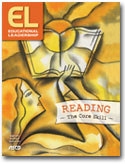Every child needs to encounter frustration and failure to learn to step back, reassess, and try again.
Should an educator ever cause a student to feel frustrated, or even to fail?
You may have raised your eyebrows or reread my first sentence just to be sure that you didn't misunderstand. After all, an affirmative answer to that question runs counter to so much of our training. Don't we always work to help our students succeed? Designing for student frustration and failure is unheard of. And that's unfortunate because the answer to my question is yes.
As important as scholastic preparation is (and it is important), it is only part of what students need to succeed in life. Howard Gardner's personal intelligences, Daniel Goleman's emotional intelligence, and Carol Dweck's mindsets all reflect the fact that our attitudes are even more important than our skills.
We know and understand some of this, of course. We work to help our students have a positive attitude about school, be good citizens, and accept others. Every teacher values student effort and responsibility. Yet an overlooked quality—one that is crucial in achieving success in the real world—is grit.
My faculty has been talking about grit since fall, after we read a New York Times article by Paul Tough called "What If the Secret to Success Is Failure?" Tough argues that success in the real world depends on far more than scholastic preparation. He argues—and my faculty agrees—that learning to respond to failure is essential to success.
Granted, we have students who struggle and whose school experiences are difficult. We create opportunities for success for those students and help them see that they can achieve. Every child needs to feel that learning is possible and probable.
For some of our students, however, learning comes easily. These are the children who are on the honor roll, play on athletic teams, participate in drama or debate, and hold offices in student government. These students come to school expecting to succeed because, well, that's what they do. We have a different obligation to these students. We need to be sure that they sometimes encounter frustration and failure.
Those are loaded terms. No one likes to be frustrated, and no one wants to fail. But every child needs to encounter frustration and failure to learn to step back, reassess, and try again—and again. It surely seems odd and perhaps heartless to create scenarios in which students are not successful, but how can they learn to overcome adversity if they haven't experienced it?
As educators, part of our job is to ensure that every child finds success, and an important part of finding success is knowing how to respond to failure. As soccer star Mia Hamm said, "Failure happens all the time. It happens every day in practice. What makes you better is how you react to it." People who have not learned to respond well to frustration and failure are likely to choose paths without much risk or challenge and thus destine themselves to a life of predictability, safety, and mediocrity.
Researcher Angela Duckworth, cited in Tough's article, showed what a predictor grit is for success in any setting, from elementary school to West Point Academy. She says that grit "entails working strenuously toward challenges, maintaining effort and interest over years despite failure, adversity, and plateaus in progress." Indeed, within a group of equally talented students, athletes, or artists, the level of grit may be the single best predictor for success. Hillary Clinton, Steve Jobs, Michael Jordan, and Maya Lin might not have had much in common to discuss over dinner, but they are each known for having an extraordinary amount of grit. (You can see Duckworth talking about grit in a TED presentation at www.youtube.com/watch?v=qaeFnxSfSC4.)
How and when to help students develop grit has been an exciting topic among my faculty. We begin by ensuring that every student confronts his or her limitations, often through rethinking how hard and where we challenge our students. For example, in addition to using multiple intelligences theory as a tool to help children learn through their strengths, we recognize that we can also require students to work in areas that are unfamiliar and less comfortable for them.
Parent education also plays an important role. We want parents to understand our rationale, and we need them to support us in our efforts to take their children out of their comfort zones.
Finally, if we want our students to develop grit, we need to do so, too. We need to take ourselves out of our own comfort zones and learn how to respond to frustration and failure. And just maybe we'll develop grit, too!
End Notes
•1 Tough, P. (2011, September 14). What if the secret to success is failure? The New York Times. Retrieved from www.nytimes.com/2011/09/18/magazine/what-if-the-secret-to-success-is-failure.html
•2 Duckworth, A. L., Peterson, C., Matthews, M. D., & Kelly, D. R. (2004). Grit: Perseverance and passion for long-term goals. Journal of Personality and Social Psychology, 92, 1087–1101.
•
